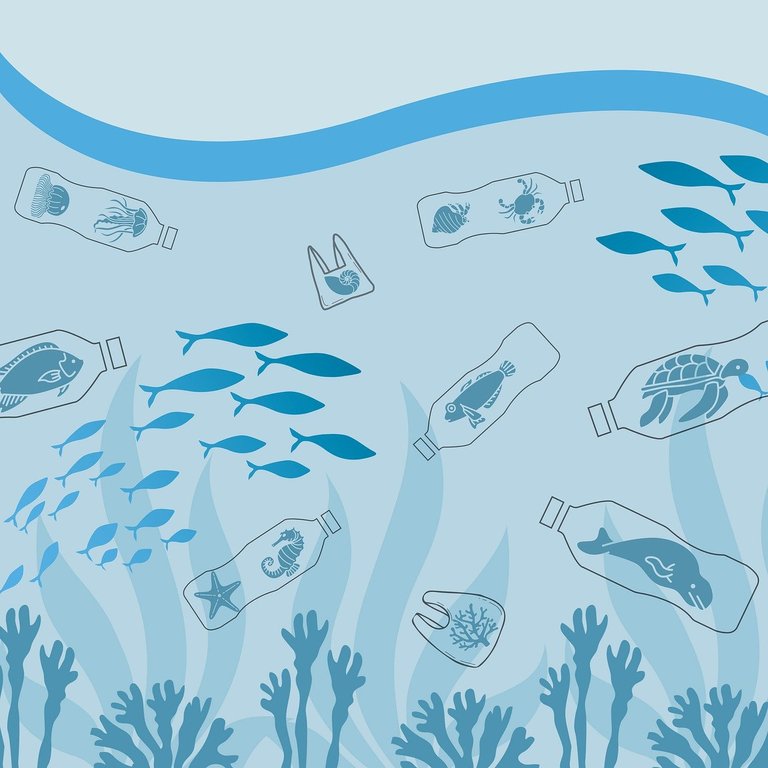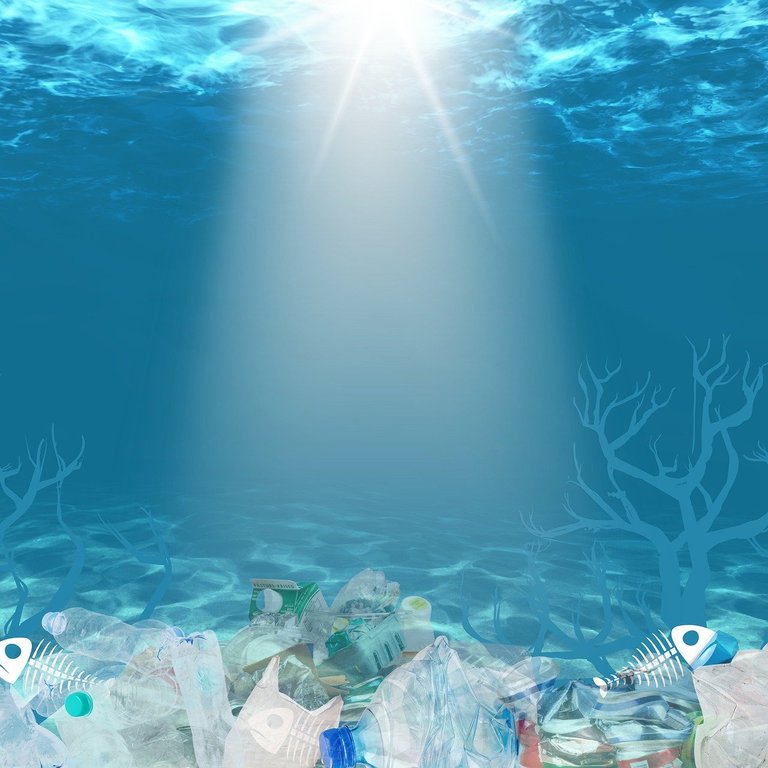
Microplastics and their effect on the environment.
In the bustling pace of our modern lives, it's easy to overlook the seemingly insignificant, especially when it comes to something as small as microplastics. These tiny, often invisible particles have, however, become a major environmental concern, posing a threat to ecosystems and human health alike.
Microplastics are fragments of plastic less than 5 millimeters in size, originating from the breakdown of larger plastic items or entering the environment as microbeads in personal care products. They're everywhere, from the depths of our oceans to the remote corners of the Earth, infiltrating soil, air, and water.

One of the primary ways microplastics find their way into the environment is through the gradual degradation of larger plastic items. Discarded plastic bottles, bags, and packaging break down over time due to exposure to sunlight, wind, and water. The resulting microplastics are so small that they can easily go unnoticed, but their impact is anything but negligible.
Beyond the direct harm to marine life, microplastics also have a cascading effect on the food chain. Predators that feed on contaminated prey end up accumulating higher concentrations of microplastics in their bodies. Ultimately, this means that the seafood we consume may carry the burden of these invisible pollutants, posing a potential risk to human health.
Microplastics aren't limited to aquatic environments; they have infiltrated terrestrial ecosystems as well. In agriculture, for example, microplastics present a growing concern. These particles can accumulate in soil, affecting the growth and health of crops. The potential consequences for food security and the long-term sustainability of agricultural practices cannot be ignored.
Studies have detected these particles in urban air, raising questions about their potential impact on respiratory health. The tiny size of microplastics allows them to be easily inhaled, posing a potential threat to human health, with implications that are still not fully understood.
Addressing the issue of microplastic pollution requires a multifaceted approach. Reduction in single-use plastics, improved waste management practices, and the development of alternative materials are crucial steps in mitigating the release of microplastics into the environment. Additionally, public awareness and advocacy play a vital role in pressuring industries and governments to take meaningful action.

The invisible nature of microplastics does not diminish their environmental impact. It's time for us to recognize the severity of this issue and take collective action to protect our planet and its diverse ecosystems. Only through a concerted effort can we hope to tackle this unseen threat and secure a healthier, more sustainable future for all.
Sources :
Taking stock of the environmental and social impacts of plastic waste
https://www.msn.com/en-xl/money/topstories/taking-stock-of-the-environmental-and-social-impacts-of-plastic-waste/ar-AA1kBvLLScientists discover microplastics in clouds
https://ny1.com/nyc/queens/weather/2023/11/02/scientists-discover-microplastics-in-cloudsMicroplastics
https://education.nationalgeographic.org/resource/microplastics/Environmental Impacts of Microplastics and Nanoplastics: A Current Overview
https://www.frontiersin.org/articles/10.3389/fmicb.2021.768297/fullMicroplastics: The long legacy left behind by plastic pollution
https://www.unep.org/news-and-stories/story/microplastics-long-legacy-left-behind-plastic-pollutionFrom creeks to clouds: The invisible invasion of microplastics
https://www.northcarolinahealthnews.org/2023/12/04/from-creeks-to-clouds-the-invisible-invasion-of-microplastics/Experiment shows biological interactions of microplastics in watery environment
https://www.sciencedaily.com/releases/2023/11/231106134928.htm
Recommended Reading
Microplastics could trigger cloud formation and affect the weather, new study suggests
https://www.cnn.com/2023/11/15/weather/microplastic-pollution-weather-study-climate/index.htmlMicroplastics: Becoming one with trash
https://www.msn.com/en-my/news/national/microplastics-becoming-one-with-trash/ar-AA1kV3xwMicroplastics were found in D.C. rivers. Researchers want to find why.
https://www.msn.com/en-us/news/us/microplastics-were-found-in-dc-rivers-researchers-want-to-find-why/ar-AA1kArjfRise of microplastics discovered in placentas of Hawaiʻi mothers
https://medicalxpress.com/news/2023-11-microplastics-placentas-hawaii-mothers.html
Nautical Movie to Watch
Ghost Ship (2002) Starring: Melissa George, Joshua McIvor, Jack Taylor
A salvage crew discovers a long-lost 1962 passenger ship floating lifeless in a remote region of the Bering Sea, and soon notices that its long-dead inhabitants may still be on board. - IMDB
Watch the full movie on Youtube from Primetime English Movies.
Shop Drop
Shop our Redbubble and Society6 listings and help fund our marine conservation goals.
Read a few of our Sunday Sea Shanty and other Seven Seas Bulletin posts on Hive :
Seven Seas Bulletin, January 21st 2023. Sustainable Fish Farming, Wild Fish Pot Pie, Waterworld Review
https://ecency.com/hive-177682/@portsundries/seven-seas-bulletin-january-21stSunday Sea Shanty - To See A Mermaid
https://hive.blog/hive-161155/@portsundries/sunday-sea-shanty-to-seeSeven Seas Bulletin, Feb 22nd 2023. 🐚 Collecting Seashells, 🍽️ Oyster Recipes, ⛵ Nautical Poetry
https://ecency.com/hive-177682/@portsundries/seven-seas-bulletin-feb-22nd
Goals of Port Sundries
- Educate the public about marine conservation and how marine conservation is important to all other ecosystems on Earth and all of humanity.
- Provide basic sailing resources and teach how the hobby and lifestyle can adapt to assist marine conservation.
- Share ecofriendly and sustainable methods of coastal and island travel and tourism.
- Share the joy of life at sea, love of ocean adventure, a fondness for culture, and the enjoyment of nautical history.
If you would like to help us with these goals, please follow. We are always thankful for those you upvote, follow, or repost.
Help defend the oceans. Support sustainable fishing and aquaculture/agriculture practices. Don't pollute your local waterways. Donate to your local marine conservation charity.
🐬🐬🐬Donate to the Dolphin Project 🐬🐬🐬https://www.dolphinproject.com/donate/
Dolphin Project is a non-profit charitable organization, dedicated to the welfare and protection of dolphins worldwide. Founded by Richard (Ric) O’Barry on Earth Day, April 22, 1970, the organization aims to educate the public about captivity and, where feasible, retire and/or release captive dolphins.
The mission of Dolphin Project is to end dolphin exploitation and slaughter, as dolphins are routinely captured, harassed, slaughtered and sold into captivity around the world – all in the name of profit. Dolphin Project works not only to halt these slaughters, but also to rehabilitate captive dolphins for retirement and/or release, investigate and advocate for economic alternatives to dolphin slaughter, and to put a permanent end to dolphin captivity.
Port Sundries is not affiliated with Dolphin Project but supports their goal 100%.
Follow us @portsundries for more Marine Conservation, Sea Life, and Sailing News.
Images courtesy of Pixabay
Sorry @archonapp wrong community selected.
Yay! 🤗
Your content has been boosted with Ecency Points, by @portsundries.
Use Ecency daily to boost your growth on platform!
Support Ecency
Vote for new Proposal
Delegate HP and earn more